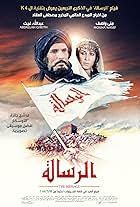Advanced search
- TITLES
- NAMES
- COLLABORATIONS
Search filters
Enter full date
to
or just enter yyyy, or yyyy-mm below
to
to
to
Exclude
Only includes titles with the selected topics
to
In minutes
to
1-50 of 93
- In 1929, Italian Fascist dictator Benito Mussolini appoints General Rodolfo Graziani as colonial governor to Italian Libya with orders to stamp-out all resistance from Libyan nationalists led by rebel guerrilla leader Omar Mukhtar.
- The story of prophet "Muhammad" and the delivery of the message of God "Allah."
- Isabella Rossellini narrates this memoir of the Sephardic Jewish population in North African prior to WWII.
- A young man named Hassin with a beautiful family including wife Fatma, daughter Maram, and son Rawad, destroys everything in a scheme to get his inheritance early. After hiring a woman to scare his father by making him sick with bad food, she shows everyone the true nature of evil. Is there any way to make things right? Why did he do this? Can a strange reclusive holy man named Talal help him?
- In "Banat Al Amm," Kholoud, raised by Uncle Nouri with cousin Afaf, faces conflict over differing dreams and values after a young man's arrival, sparking a bitter rivalry.
- Man of faith meets with a group of atheists.
- An epic war film about the battle between the Italian and Libyan armies.
- The Two Leaders , series Historical drama portrays the life of the Libyan activists Suleyman Albaruni and Bashir Alsaadawi through a distinct and new storytelling that is being narrated by Zaema Albaruni Suleyman Albaruni's daughter.
- In a corrupt administrative system, a new minister imposes his authority harshly on his employees, excluding anyone who might challenge him or express his ideas, but soon an unexpected threat appears that changes the course of events.
- Follows a part of al-Qaramanli dynasty's reign over Tarabulus (Tripoli, Libya) that takes place between 1783 and 1795, Hassan Bek, the son of Ali Pasha, is known for his fairness and his valor in defending his country, which arouse the hatred of his two brothers, Ahmad and Yusuf, especially after the governor, Ali Pasha, falls ill with tuberculosis, leading to a power struggle.
- Wesam is a Libyan young activist in the Libyan civil society who gets abducted, jailed, and tortured for talking on a TV channel about human rights in Libyan prisons in a country denominated by a huge number of armed militias that use oppression and intimidation. Inside the prison, Wesam encounters various forms of ideologies and beliefs adopted by those militias that vary between tribal militias, long-practiced militias using excessive force, and militias that control all these groups and use them for their own interests and to hold the reins of the government. Wesam, through a TV channel, spoke about the concept of Al Emarah from his perspective, which provoked the fury of those groups that perceived it as a provocation of the "state project" they want to establish according to their view. This will be summarized in the final scenes of the movie when we have a look at Al Emarah through the eyes of these groups
- The series falls under the category of suspense and excitement drama series, with interesting events and secrets that are not revealed until the final moments of the work.
- Libyan women had so many dreams post 2011 revolution. Whatever happened to them?
- Umm Ektanbo is a Libyan comedian cartoon series that expresses daily funny stories of an old troublemaker woman called "Umm Ektanbo".
- Mary Lou Anderson is "Gracie the Good Witch", in this 1955 television show for families at the USA Air Force Base in Tripoli, Libya.
- Post 2011 Libyan revolution, Tripoli saw a series of attacks by religious extremists damaging Sufi shrines such as the beautiful 18th century Ahmed Pasha Karamanli mosque.
- Libyan drama series that chronicles the pre revolution phase, the revolution phase, and the aftermath from a social standpoint, and its impact on the revolution and its repercussions.
- Al-Barony's film deals with part of the life of the well-known Libyan freedom fighter (Suleiman Pasha Al-Barony), better known as "The Leader", who was born in 1870 in the city of Kabao in the Nafusa Mountains of Libya.
- Haja Fatma, a mother to eight children, tells the tale of family life in Tripoli during the Libyan Revolution. Women, young and old, all contributed during these hostile months in their own unique way. A human portal into the acts of ordinary people in their hope for freedom.


















